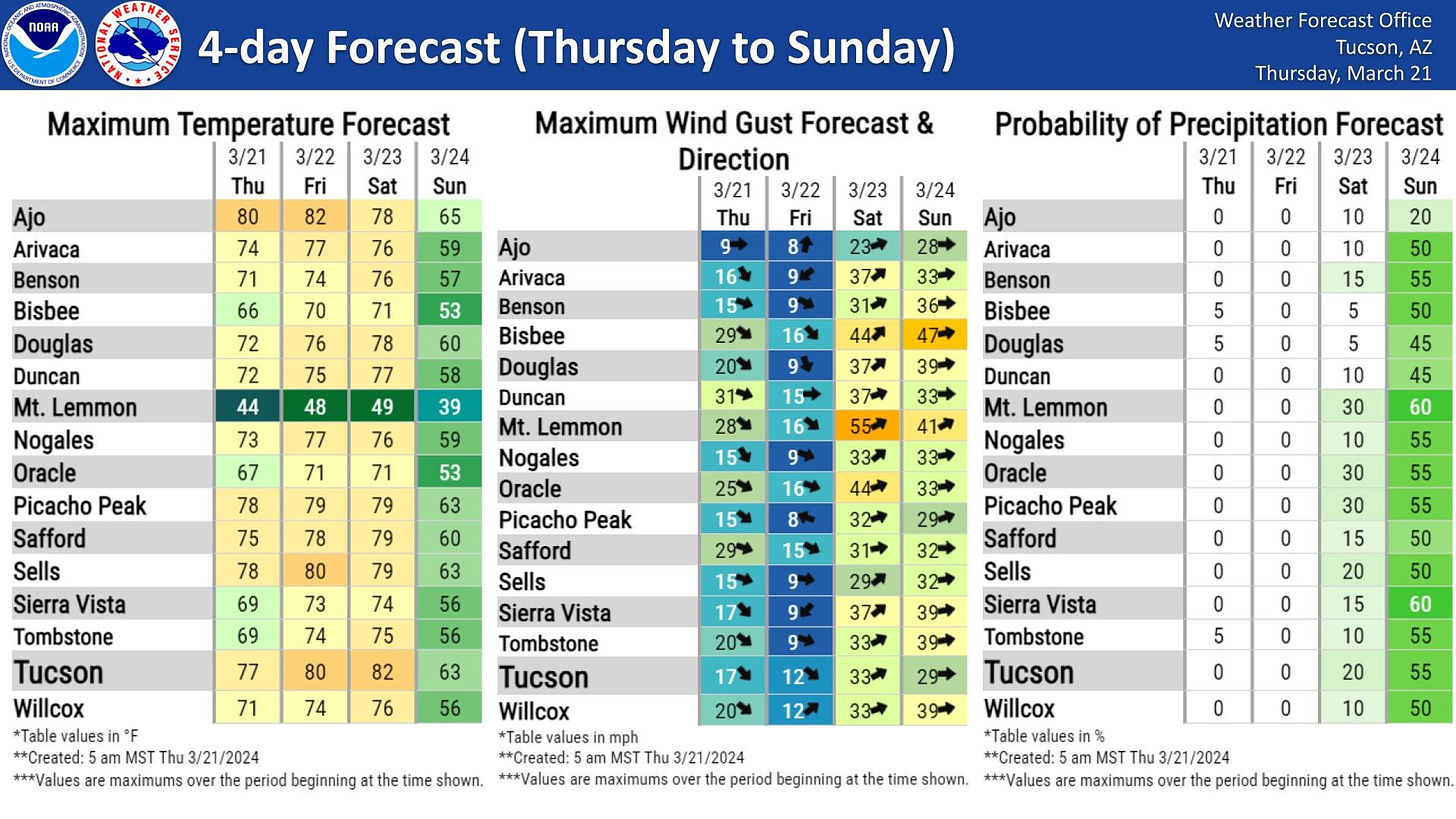The Daily Agenda: Swimming through the tsunami
A wave of local elections is coming at you ... Here's our plan to make sense of it all ... TUSD moving money around.
With so many local elections coming up, it can feel like a tidal wave of names and issues rushing at you.
If you’re a voter in the Tucson area, you’re going to have to sort through dozens of elections for county officials, school boards, state legislators, Congress, the Arizona Corporation Commission, and a U.S. senator. Not to mention all the ballot measures coming from the state Legislature and the special election in Tucson for a sales tax.
That’s a lot to deal with, right? It’s easy to get overwhelmed or burn out on the whole thing.
That’s where we come in. We’ve done all this before and we’re excited to do it again.
When we launched last July, the Tucson City Council elections were halfway over. This time around, we get the chance to plant our feet and plan ahead.
We’re already well on our way. Over the past few months, we covered the candidates and the broad strokes of the races for the big Pima County offices, constables, justices of the peace, school boards, and state legislators.
Now that the slate of candidates is about to be set on April 1, we’re entering the next stage in our election coverage.
So today we’re going to explain how we think about covering elections and the nuts and bolts of how we plan to cover them this year. Consider it a road map for the next eight months.
Our approach to elections
We view election coverage as a core responsibility of the Tucson Agenda. It is our job to bring you clearly written, methodically reported, insightful coverage of candidates and issues.
We stay 100% local. You can read about Trump and Biden in plenty of other places.
Our main goals are to help you follow along during election season with steady coverage and to build the resources, such as a curated archive of news coverage, you need to quickly figure out what’s what and who’s who when your ballot arrives in the mail.
There will be zero dollars flowing from campaigns to the Agenda. We won’t run political ads or smudge the line in any way.
But we’d sure appreciate dollars from our readers! That’s honest money as far as we’re concerned.
How we do it
Interview as many candidates as we can. Whenever possible, we’ll do them via zoom. That way we can record them and share them with you, as well as build an archive you can consult when your ballot arrives in the mail.
Listen to our readers. We certainly have issues we’d like to ask candidates about, such as what sheriff candidates plan to do about the troubled county jail. But we’d also like our readers to help guide our questions. Comment on Agenda stories with the issues that matter to you. Write letters to the editor. Email us at curt@tucsonagenda.com or caitlin@tucsonagenda.com. Whatever you like best.
Track endorsements. The officials and organizations that endorse a candidate say a lot about a candidate.
Follow the money. We’ll keep tabs on the money that flows into campaigns and the outside money that supports candidates through political action committees.
Focus on races where voters have a choice to make. With so many elections, we can’t afford to devote much of our time and energy to races where candidates run unopposed.
Explain the decisions that shape elections, such as who the county supervisors appoint next month to finish the rest of Treasurer Beth Ford’s term.
Demand transparency. Reporters act as advocates for the public when it comes to wrangling information from candidates. They way they campaign is the way they’ll govern, as the old saying goes.
Recognize that the Agenda isn’t the only game in town. Other news outlets cover elections, of course, so we’ll highlight their coverage in our Other News section. We’ll also point you to Clean Elections Commission debates for legislative candidates, as well as the League of Women Voters of Greater Tucson candidate forums for local offices.
Keep expanding the conversation. Our new reporter, Susan Barnett, will make sure the perspectives of Latino voters are part of our coverage, thanks to a grant from the Local News Initiative of Southern Arizona. We’ll also have to keep looking for ways to incorporate more diversity of people and views.
Covering elections is a lively, complex endeavor. We’ll adapt to whatever happens, of course, and we inevitably will have new ideas about how to keep you informed as we go along. But we thought it was worthwhile to take a moment and explain what we’re trying to do here.
We’re going to put in a lot of work to make sure you know what the deal is. That deserves a cocktail or a coffee, right? For the price of a mojito or an americano, you could help us stay in business.
Searching for solutions: Tucson Unified School District Officials are mulling tapping into the district’s desegregation funds to cover the $3.6 million needed to cover the cost of keeping its learning recovery interventionists currently paid for by federal pandemic funding, the Arizona Daily Star’s Jessica Votipka writes. The federal funding is set to end in September, giving the district a short deadline to find money to pay the staffers who help students who’ve fallen behind. TUSD recently regained more control over desegregation funds, with the district saying reallocating the money would be a viable solution to keeping the interventionists.
One step closer: A house bill challenging shared governance at Arizona’s public universities passed the Senate Education Committee Wednesday and will move onto a full Senate vote, putting it only a step away from reaching the governor’s desk, the Arizona Luminaria’s Carolina Cuellar reports. HB 2735, which removes language from state laws that empower faculty members to participate in decisions involving academic matters at the universities, passed the committee by a vote of 4-3.
Planning for the future: KJZZ’s Gabriel Pietrorazio profiled University of Arizona researcher Michael Kotutwa Johnson, a Hopi dry farmer working within the School of Natural Resources and the Environment to safeguard seeds from threats of climate change and commercialization. Johnson is heading up a nearly half-million-dollar four-pronged project funded by the Rockefeller Foundation’s Climate Exploration Fund that seeks to identify the best ways to grow Hopi dry corn. Johnson is looking to develop a data governance model to safeguard the traditional agricultural knowledge, cultivate a Southwest regional food network and conduct nutritional analyses on at least two varieties of corn.
The eagle has landed: President Joe Biden championed Arizona as America’s future while celebrating an agreement to provide Intel with up to $8.5 billion in direct funding and $11 billion in loans for computer chip plants around the country, the Associated Press reports. Biden toured Intel’s Ocotillo Campus in Chandler Wednesday, inspecting silicon wafers and talking about the impact his policies could have on the U.S. economy.
“This isn’t just about investing in America,” Biden said, “It’s about investing in the American people as well.”
Shelter shuffle: Douglas officials are thinking outside of the box to find ways to help migrants released into the community, with federal funding for the transportation of processed asylum seekers set to expire at the end of the month, KGUN’s Alexis Ramanjulu reports. A religious organization has been serving as a temporary shelter since October, but Mayor Donald Huish says the city may have to take over those operations so the group can have its facility back. The city council approved funding to help with food and laundry service costs, to assist volunteers at the temporary shelter.
Under pressure: U.S. Rep Raúl Grijalva sent a letter this week to House and Senate Appropriations Committee leaders, urging them to fully fund the installation of fentanyl scanners and other non-intrusive technology at U.S. ports of entry, the Star’s Emily Bregel writes. Grijalva called recent reports that the scanners are sitting unused in warehouses “troublesome” and said the situation “must be immediately addressed.” U.S. Customs and Border Protection hasn’t yet responded to the Star’s inquiry about whether any unused inspection equipment is waiting to be installed at Arizona ports of entry.
19: The number of degrees that separates Saturday and Sunday’s forecasted high temperatures in Tucson. We’re looking at a balmy 82 degrees on Saturday, but bundle up Sunday, because it’s only expected to warm up to 63 degrees.










I do hope, when you cover TUSD, that you will cover the active members of the community that call for accountability for the district. The board meetings and a meeting held the other night about moving the desegregation around included some very important comments critical of the idea. There is usually another viewpoint than that of the district of their actions but it tends to get MUCH LESS coverage than "the official story". Particularly when it comes to using the deseg money as a district-wide ATM machine or slush fund, there is clearly always more than one side to the story. In addition, I would just like to add that endorsements are NOT always a good indicator of a candidate's value for the job: they may come because a candidate (especially incumbents) is better connected to the entity than others,or because a candidate is a member of a political machine that subsidizes volunteer workers, offers free office space, etc. or all of the above and more. Obviously endorsements have value, but probably not as clean a value as the sort of meritocracy that you imply that they represent. You only need to run one time to see all of the myriad ways that newcomers are at a gros disadvantage when it comes to endorsements, entry, attracting aid, volunteers, etc.